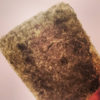
Microbial cellulose
Microbial cellulose, or bacterial cellulose, is a natural and biodegradable cellulose. It is formed during a fermentation process by a combination of bacteria and yeast. It grows on top of a fermenting liquid, such as black or green tea, with sugar and an acid component.
This regenerative process is an ancient fermentation method that provides a naturally carbonated drink: kombucha tea. The material was long seen as a by-product without purpose, apart for starting a new brewing process. However, when dyed and dried it has similar experiential properties as leather, and therefore sometimes is called ‘vegan leather’.
Material experiments included growing conditions, drying methods for surface texture, natural coloring and processing techniques. Besides the material development itself, this research included an exploration of the functional material properties for product design, such as its self-adhesive qualities and conductive behavior.
The material experiments were done within the larger Tea Web research project. This web research project aims to serve as a prototype for zero waste food networks: offering future proof healthy food and beverages, while valorising all residual materials through material development for product design.
The left over tea leaves formed the starting point for another research project: the Tea Textile research project.



